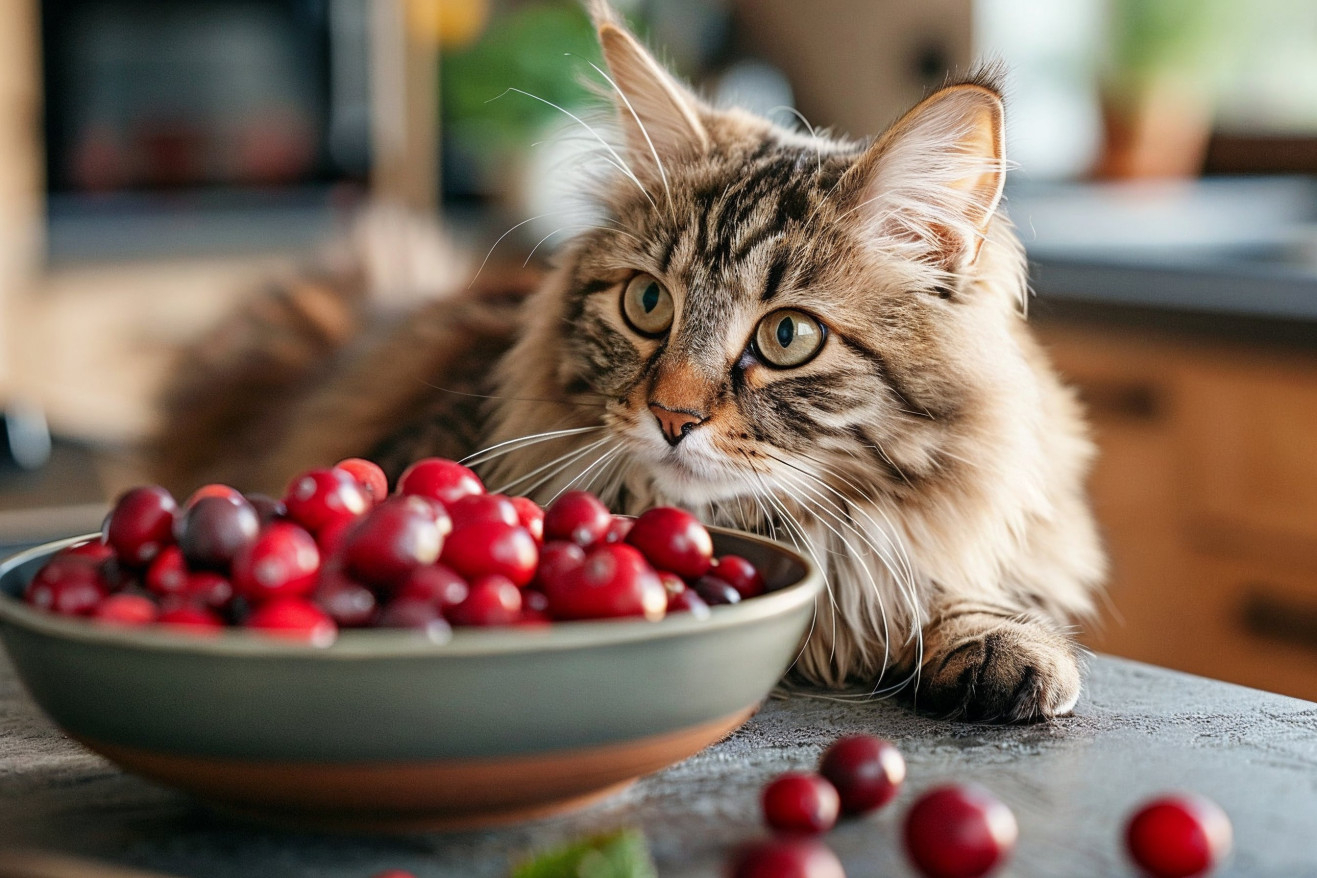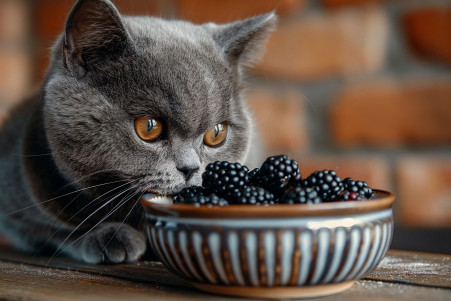Can Cats Have Cranberries? What You Need to Know
16 May 2024 • Updated 16 May 2024

If you're thinking about giving your cat a taste of cranberry sauce, you may be wondering if it's safe to share your favorite tart, tangy berry with your feline friend. While it's best to avoid giving your cat cranberry sauce, fresh or frozen cranberries are safe for cats to eat in small amounts as an occasional treat. Not only are cranberries non-toxic to cats, but they also have several health benefits, including supporting urinary tract health and providing antioxidants. However, because cranberries are highly acidic, they can cause stomach upset when consumed in large amounts. As a result, you should limit the amount of cranberries you give your cat and avoid cranberry products that contain added sugar.
In this article, we'll take a deep dive into the most recent veterinary research to determine whether cranberries are a valuable addition to your cat's diet. By providing a well-rounded view of clinical research, expert opinions, and an understanding of a cat's dietary requirements, we'll help you understand how to safely add cranberries to your cat's diet to maximize their potential health benefits while minimizing the risk of stomach upset.
Can cats eat cranberries?
What Are the Health Benefits of Cranberries for Cats?
Cranberries are full of healthy compounds that can provide a number of health benefits for cats. As explained by Catster, cranberries are a good source of vitamin C, which can help support the immune system, as well as vitamin K and the mineral manganese. In addition, their antioxidants and polyphenols can help reduce inflammation in the body.
That said, the most important potential benefit of cranberries for cats is their ability to support urinary tract health. A study referenced by NIH showed that cranberry compounds can stop certain bacteria from sticking to the bladder wall, which can help lower the risk of UTIs. Although more research is needed to confirm this for cats, a more recent study demonstrated that cranberry supplements can help reduce the symptoms of feline idiopathic cystitis (FIC), a common urinary issue.
That said, as pointed out by CatTime, cranberries are high in oxalates, which some experts have suggested may contribute to the formation of bladder stones in cats that are predisposed to them. So while cranberries can be helpful, there are some things to keep in mind when giving them to your cat, which we'll discuss in the next section.
Potential Dangers and Precautions of Feeding Cranberries to Cats
Although cranberries are safe for cats to eat, there are some potential dangers to consider. According to Catster, the oxalates in cranberries can lead to an increased risk of oxalate crystal formation and bladder stones in certain cats. Preventive Vet explains that cats with urinary issues or a history of bladder stones should avoid or limit their intake of cranberries because the oxalates can make the problem worse.
Moreover, Vet Help Direct points out that whole cranberries can be a choking hazard, so they need to be chopped or pureed before being given to cats. Finally, cranberry products that contain sugar or artificial sweeteners can be toxic to cats and should never be given to them.
Safe Ways to Give Cats Cranberries and How Much to Give
Fresh or frozen cranberries are the safest way to give cats cranberries since they don’t have any added sugars or preservatives. The Meow Place notes that fresh or frozen cranberries are a better option than cranberry sauce, which can be toxic because of the sugar in it. Dried cranberries that don’t have any added ingredients are another option, although they should be given in smaller amounts because they are more concentrated.
Cranberry supplements, including capsules and powders, can be a good way to give cats the benefits of cranberries, but it’s important to get the right dosage from a vet. According to VetRxDirect, the recommended dosage for cats is 1/2 to 1 capsule twice a day. When it comes to fresh or frozen cranberries, a good rule of thumb is 1-2 tablespoons a day for an average-sized cat, split into smaller servings.
Cranberry cat treats that have been specifically formulated for cats are another safe and easy way to give cats cranberries, but it’s important to read the label to make sure they don’t contain any ingredients that could be harmful or that your cat is allergic to. While these treats can be a fun way to give cats cranberries, it’s still important to make sure you don’t give them too many.
Cranberry Juice and Cranberry Sauce: Potential Risks for Cats
Cranberry juice, especially those with added sugars or artificial sweeteners, is not recommended for cats. According to Catster, the high sugar content in cranberry juice can cause digestive upset, obesity, and other health issues in cats. Cranberry sauce is also not recommended for cats because of its high sugar content and the potential for other harmful additives.
While cranberry juice and sauce may be helpful for people, they don’t have the same benefits for cats and can actually be harmful. As Small Door Veterinary explains, the sugar in these products makes them unhealthy for cats. If you want to give your cat cranberries, it’s best to use fresh or frozen cranberries or a cranberry supplement that’s been approved by a veterinarian.
Talk to a Vet and Introduce Cranberries Safely
Make sure to talk to your vet before you give your cat cranberries or cranberry supplements. According to WagWalking, your vet can give you advice that's tailored to your cat's age, health, and any medical issues they may have. They can also let you know what dosage and form of cranberry supplements would be best for your cat.
In addition, Catster recommends that you introduce cranberries or cranberry supplements to your cat's diet slowly so you can see if they have any negative reactions or digestive problems. And according to CatTime, you should think of cranberries as a supplement or a special treat and not a substitute for a well-balanced diet of complete cat food.
Conclusion: Use Moderation and Seek Veterinary Advice
Cranberries can be a safe and potentially helpful part of a cat's diet if they are given in moderation and with the right precautions. Fresh or frozen cranberries, or cranberry supplements that have been approved by a veterinarian, are the best options for cats. While cranberries may have some health benefits, including supporting urinary tract health and providing antioxidants, more research is needed.
It is important to work with a veterinarian who can help ensure the right dosages, watch for side effects, and consider any other health concerns. Cranberries should be considered a supplement or treat and not a substitute for a complete and balanced cat food diet.


